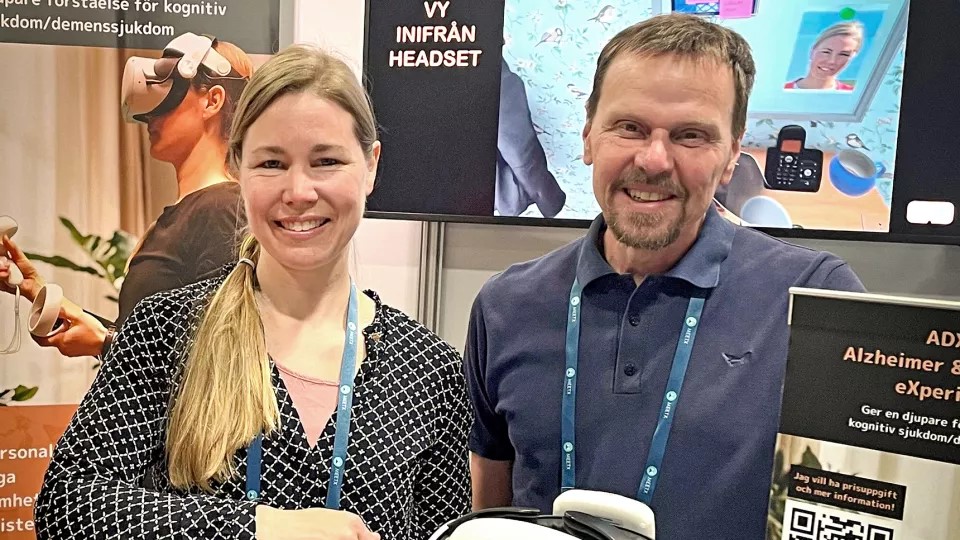Successful commercialisation of dementia simulator
What does it feel like to live with dementia? The answer is offered by the “dementia simulator” developed by virtual reality researchers at the Faculty of Engineering, LTH. The simulator takes the user into a virtual world to experience different aspects of life with a cognitive disorder.
Jessika Sellergren – Published 12 September 2024

LTH researchers Joakim Eriksson and Maria Hedin have been working for several years on virtual experiences of nature for older people with dementia. VR technology has been used in several nursing homes in Skåne and has contributed to positive health outcomes for the residents. The technology has resulted in a product that is now used by dementia care professionals and carers of people with cognitive disorders. It is hoped that the simulator will help to improve dementia care.
“When we describe the dementia simulator, we usually call it an insight simulator. The user puts the headset on and steps into a kind of inner monologue, allowing them to experiencefrom a first-person perspective the difficulties experienced day-to-day by a person with a cognitive disorder,” says Maria Hedin.
The researchers have been able to develop their VR product in collaboration with dementia nurses and relatives of dementia patients, with funding and support from LU Innovation, the Swedish Alzheimer’s Foundation and Burlöv municipality.
Support from LU Innovation
Joakim Eriksson says it would have been difficult to take the simulator idea further without the involvement of LU Innovation:
“We have no previous experience in commercialising research and have received a lot of support on issues related to legal aspects, how much to charge for licences and how to think more commercially. We’ve learnt a lot and feel more confident as we take our product to a wider market.”
The market for the product is mainly dementia care professionals, but also family members and people working in various community roles.
“This could be someone working on the checkout at a supermarket, a bus driver, the home help – anyone who interacts with people in their professional role,” says Maria Hedin.

Several municipalities have implemented the ”dementia simulator” as a part of their training programmes. Maria Hedin, researcher at LTH, to the right. Photo: Yanan Li
Used in several municipalities
A simple everyday situation can be frightening for a person with impaired cognition. For example, they might forget that a loved one has passed away. The simulator helps the user understand how this might feel, which can make it easier for them as an outsider to the situation to respond to those feelings.
“The reminder of a loved one’s passing can feel like receiving news of their death over and over again. Who wants to experience the powerful emotions that come with the death of someone they love several times a day? Treating them with dignity is important so as not to make the situation even more difficult or unpleasant for the person with dementia, and our VR product can help with this,” says Maria Hedin.
The dementia simulator has been well received by users, and several municipalities have now implemented it as part of their training programmes. The researchers organise meetings to learn what users think and how the product can be improved.
“By having a dialogue, we can adjust the technology based on what they want and need,” says Joakim Eriksson.

Helping researchers who want to start companies and develop innovations
The article "Successful commercialisation of dementia simulator" was originally published in LUM (Lund University Magazine). It is part of a theme block on innovation with more innovation examples from the university's other faculties.
Helping researchers who want to start companies and develop innovations | Staff Pages (lu.se)
